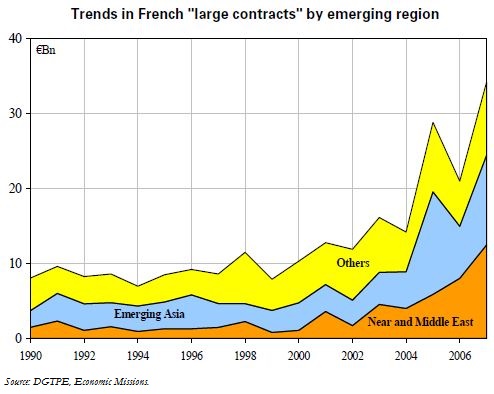Trésor-Economics No. 34 - "Large contracts" signed by French firms in the emerging countries
A transaction is considered to be a "large" contract when the French share of it exceeds €3 million. Large civil contracts signed by French firms in the emerging countries are reported on a quarterly basis by the international network of Economic Missions of the Ministry for Ministry forthe Economy, Industry and Employment. These major contracts have a direct impact on French exports, and in particular on their breakdown by sector and geographical region. Their total amount was relatively stable in the 1990s, but it has accelerated significantly since 2000. They totalled €35 billion in 2007 (representing more than a third of total exports to the emerging countries). This total is increasingly concentrated on a handful of very large amounts.
Aerospace contracts (around 40%) have increased their share in recent years. Apart from aerospace, construction and energy facilities operating contracts have grown in importance in response to the need of non-oil producing countries to diversify their energy sources (nuclear power), and also in answer to producer countries' infrastructure needs.
Major contracts give rise to exports of capital goods. The lead time between signature of the contract and effective delivery can vary, from 1 to 2 years on average, not including aerospace where deliveries can take several years. Major contracts and exports of infrastructures are helping to raise the value added of our exports to these countries, contributing to a welcome redirection of our exports towards the most dynamic regions of the world.
Emerging Asia has long been the number 1 client region for French firms. The Gulf States have grown their purchases significantly in recent years and have matched emerging Asia for the past two years.
The process of catching up by the emerging countries, their infrastructure needs, and more generally the growing prominence of energy and environmental questions, all suggest there is considerable potential in the coming years.
